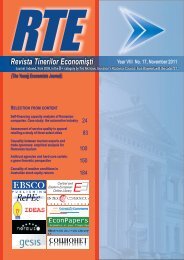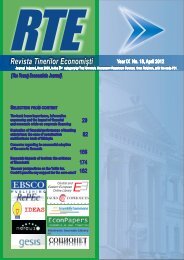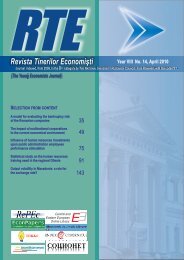Revista Tinerilor Economiºti (The Young Economists Journal)
Revista Tinerilor Economiºti (The Young Economists Journal)
Revista Tinerilor Economiºti (The Young Economists Journal)
You also want an ePaper? Increase the reach of your titles
YUMPU automatically turns print PDFs into web optimized ePapers that Google loves.
<strong>Revista</strong> <strong>Tinerilor</strong> Economişti (<strong>The</strong> <strong>Young</strong> <strong>Economists</strong> <strong>Journal</strong>)<br />
we pursue the others? This goal is the good.<br />
<strong>The</strong> science which deals with the discovery and knowledge of this good is the<br />
politics. <strong>The</strong> goal which Aristotle initially imposes to this discipline aims at the role<br />
which it should play in the society.<br />
<strong>The</strong> politics is that science to which the others (rhetoric, law) are<br />
subordinated. Like Plato, Aristotle considers that it is really important to search for the<br />
good at the level of the walled city, that is the good for everybody, because this will be<br />
the good for each one. A state must be sufficient for itself and accomplish the goal for<br />
which it exists: welfare. This is identified with “eudemonia” (happiness), which is also<br />
the individual’s goal. „<strong>The</strong> fundamental principle of democratic constitution is liberty<br />
[…] <strong>The</strong> first form of liberty is to lead and to be lead successively […] Another form is<br />
everybody’ s right to live as he likes” (Aristotel, 2001).<br />
Plato–as representative of ethical-political paradigm–maintains the same<br />
theorem of man’s natural sociability. Man must be studied both at individual level and<br />
especially at broader level of his public, political and social level. <strong>The</strong> author asserts –<br />
through the voice of his character, Socrates – that the birth of a walled city occurs<br />
because “each of us is not autonomous, but he lacks many things” (Platon, 1966). From<br />
this point of view, the state-public system arises in order to cover and to realize “the<br />
lack of self-sufficiency and work division” (Carpinschi, 1995) which become<br />
fundamental for any walled city.<br />
<strong>The</strong> politician or the decider has to aim at realizing the justice (dike), legal<br />
order (eunomia) and peace (eirene). <strong>The</strong> perfect walled city can be realized if the<br />
politics will follow the principle of justice and if it would be administered by a leaderwise<br />
(king-philosopher), guided by the idea of Good. So the justice becomes a common<br />
property of both the individual and the state and for the walled city it means the<br />
principle of oikeiopragia, that is everybody has to do what he knows to do, the things<br />
for which he was born for.<br />
Hence we can conclude that public politics, as applied part of politics and<br />
applied activity of the institutionalized-etatic system, aims at the general good of<br />
society and must be understood as teleological actions, with a public and ethic<br />
dimension.<br />
3.2. Public politics – from ethics to an ideal hierarchy of interests<br />
From moral point of view, public politics have to ensure the common good<br />
for different social, political, economical, cultural groups within a society. <strong>The</strong><br />
resources or the capital allocation of different groups is a game of null sum which<br />
generates winners and excluded. <strong>The</strong> dilemma of correct resources allocation and of<br />
right choice among values and concurrent principles which may appear when it is about<br />
public decision arises from the point of view of an applied ethics within the practice of<br />
public politics. To establish the moral acceptability of the same act, to do competing or<br />
even contradictory evaluations for the same decisional act suppose the analyse and<br />
selection of different relevant consequences, of people or affected or implied groups.<br />
From the point of view of classical utilitarians (J. Bentham, J. St. Mill), the<br />
taking of the decision is based on principles of hedonist structure. <strong>The</strong> public decisions<br />
will affect the members of the community in the following way: „they will produce<br />
them certain pleasures or, on the contrary, they will produce them displeasures,<br />
112















